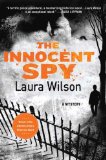Summary | Excerpt | Reviews | Beyond the Book | Readalikes | Genres & Themes | Author Bio

A Mystery
by Laura WilsonONE
A child saw her first.
June 1940, Fitzrovia: five o’clock, and the sky overcast. The boy,
six years old, had been running half-heartedly up and down the
empty street, pretending to be an aeroplane, but it wasn’t much
good without the others. He’d been delighted when his mother
came to take him away from the farm, with its pig-faced owner
and the huge smelly animals that still chased him, snorting and
steaming, through nightmares. His mother, smothering for the first
few days, had soon tired of him under her feet and turned him
outdoors to play, and three months on, with most of his friends
still evacuated and his old school requisitioned by the ARP, he was
bored.
He picked up a stick and ran it up and down the iron railings
in front of the tall houses, then turned the corner and, sighing, sat
down on the kerb and pulled both his socks up, hard.
Raising his head, he saw a sack of something draped over a set
of railings further down. It hadn’t been there when he’d run down
the road after his dinner, he was sure. He dawdled along for a
closer look. It wasn’t a sack, but a woman, impaled on the sharp
black spikes. He stared at her, uncomprehending. Face down, her
dress was caught up round her waist, and he could see her drawers.
He extended a finger and poked her shoulder. Under the slippery
material, she felt scraggy and bony, like the meat his mother sent
him to fetch from the butcher’s. She seemed to have two lots of
hair, one short, brown and stiff looking, on the back of her head,
and the other, longer and yellow. This top hair had slipped forwards,
hanging down on either side of her face so that he couldn’t
see what she looked like. He considered this for a moment, then
looked down at the pavement, where a number of little round white
things were scattered. He picked one up and rolled it between his
fingers - hard and shiny. A sweet? He put it in his mouth, sucking
first, then testing it against his teeth. It felt slightly rough when he
bit it, but tasted of nothing. Spitting it into his palm, he squatted
down and peered up at the face between the long yellow curls.
In shadow, upside down, one eye stared back at him. The other
was closed - a long, lashless slit like a wound, its outer corner pulled
upwards, as if by invisible thread. Then, with a groan, the mouth
opened, a black, cavernous O, to swallow him whole.
He screamed. Someone else screamed, too, and for a moment
he thought it must be the woman, bent on eating him alive. Then
feet pounded towards him, and in a confusion of shouts, gasps
and police whistles, an unknown hand pressed his head to an alien
bosom. Howling and thrashing in terror, he was carried away down
the road, pounding at his rescuer, the single pearl still clutched in
his left fist.
TWO
The barrage balloons were shining in the evening sun. DI Ted
Stratton squinted up at them. He felt, as he always did, comforted by
their rotund, silvery serenity. Despite everything, he thought - first
Norway and Denmark, then Holland, Belgium, and now France,
like dominoes - it was hardly a picture of a country at war. For
Stratton, the word conjured up bullet-riddled scarecrows sprawled
across the wire in No Man’s land, even though the Great War had
ended too soon for him to be called up, leaving him unable to tell
whether he was glad or sorry. That had been his brothers’ war; the
eldest had died. It had come as a shock to realise that, at thirty-five,
and in a reserved occupation, he’d be too old for this war - for
the time being, at least. He was fit enough, strong and muscular,
but he certainly looked his age; a broken nose and a great deal of
night duty had given him a battered, serviceable appearance. In a
way, thought Stratton, this war’s everybody’s, even the nippers’.
Terrible that it should have come to this, but exciting, that sense
of something happening, of being poised in history, alone, at the
very centre of the map, of the world tilting on its axis: shall we be
next?
Excerpted from The Innocent Spy by Laura Wilson Copyright © 2009 by Laura Wilson. Excerpted by permission of Minotaur Books, a division of Macmillan, Inc. All rights reserved. No part of this excerpt may be reproduced or reprinted without permission in writing from the publisher.
If every country had to write a book about elephants...
Click Here to find out who said this, as well as discovering other famous literary quotes!
Your guide toexceptional books
BookBrowse seeks out and recommends the best in contemporary fiction and nonfiction—books that not only engage and entertain but also deepen our understanding of ourselves and the world around us.